Three Ways the Leichtag Foundation supports Farm to School in San Diego County
October was National Farm to School Month, a time to celebrate the connections that are happening all over the country between children and local food! National Farm to School Month was designated by Congress in 2010 to demonstrate the growing importance of farm to school programs as a means to improve child nutrition, support local economies and educate children about the origins of food.
Three Ways the Leichtag Foundation supports Farm to School in San Diego County
1) Jewish Food Justice Fellowship Placement Site – Farm to School Taskforce
Community Health Improvement Partners (CHIP) is the engine behind the Farm to School efforts in San Diego County. CHIP co-launched the San Diego County Farm to School (F2S) Taskforce in 2010 in conjunction with Whole Foods Market to help a handful of growers and school districts increase opportunities for the procurement of locally grown food in schools. The mission of the taskforce is to increase food literacy and access to local, healthy foods in school cafeterias through collaboration, education, environmental change, program development, and outreach. Today, the F2S Taskforce has grown to include more than half of San Diego County’s school districts, two regional distributors, four local farms, and numerous other players.
Leichtag Foundation Jewish Food Justice Fellow, Yasha Magarik, has worked at CHIP 3 days a week for the past year, helping to support and expand the work of the Farm to School Taskforce.
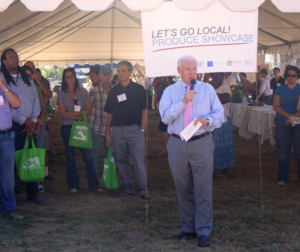
San Diego County Supervisor Ron Roberts (4th District) speaks to “Let’s Go Local!” participants.
2) Hosting Farm to School Events at the Ranch
On August 1st, the F2S Taskforce held its bimonthly meeting in Barn 2 on the Leichtag Foundation property. On October 24th, we were especially pleased to host the 2nd annual Let’s Go Local! Produce Showcase. Thanks to Yasha’s contributions, CHIP was able to triple the number of growers than participated the year prior. The event brought together growers interested in expanding their markets and buyers from institutions, such as schools and hospitals. San Diego County Supervisor Ron Roberts (4th District) spoke at the event on the importance of this growing movement.
3) A New Grant to support CHIP’s F2S Efforts in 2015
The Leichtag Foundation is pleased to announce a grant of $50,000 to CHIP to support their continued efforts. This grant will allow CHIP to hire a full-time Farm to School Coordinator to replace Yasha as his fellowship placement at CHIP ends in December 2014. A full-time person in this position will also bolster CHIP’s capacity to provide technical assistance to schools, institutions and growers, including those in coastal North County.
To learn more about the San Diego Farm to School Taskforce, visit CHIP’s website and read The State of Farm to School in San Diego County.



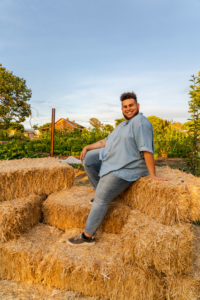 Black, Jewish and Queer. These three identities weave the fabric of who I am, but it took a long time to believe that they could exist together.
Black, Jewish and Queer. These three identities weave the fabric of who I am, but it took a long time to believe that they could exist together. Lee and Toni Leichtag established the Leichtag Foundation in 1991 following the sale of their business. Lee and Toni were lifelong entrepreneurs with a passion for innovation and for supporting talent. They believed that only with big risk comes big reward. Both born to families in poverty, Toni to a single mother, they strongly believed in helping those most in need and most vulnerable in our community. While they supported many causes, their strongest support was for young children and the elderly, two demographics who particularly lack voice in our society.
Lee and Toni Leichtag established the Leichtag Foundation in 1991 following the sale of their business. Lee and Toni were lifelong entrepreneurs with a passion for innovation and for supporting talent. They believed that only with big risk comes big reward. Both born to families in poverty, Toni to a single mother, they strongly believed in helping those most in need and most vulnerable in our community. While they supported many causes, their strongest support was for young children and the elderly, two demographics who particularly lack voice in our society. Lifelong Baltimoreans, Rabbi George and Alison Wielechowski and their sons, 11-year-old Lennon and 9-year-old Gideon, are more than pursuing the good life in Southern California. Having moved to San Diego more than three years ago, they are fulfilling a lifelong dream.
Lifelong Baltimoreans, Rabbi George and Alison Wielechowski and their sons, 11-year-old Lennon and 9-year-old Gideon, are more than pursuing the good life in Southern California. Having moved to San Diego more than three years ago, they are fulfilling a lifelong dream.
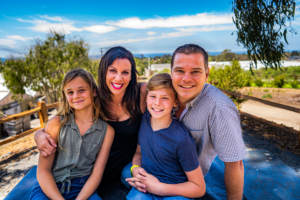
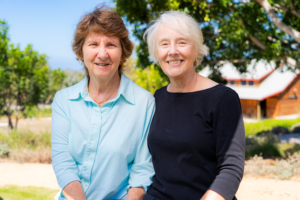

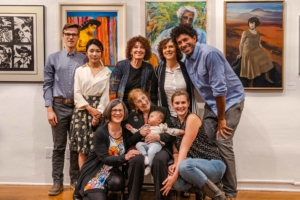
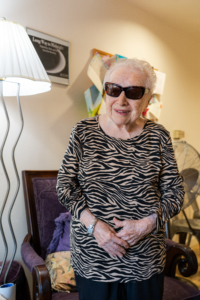
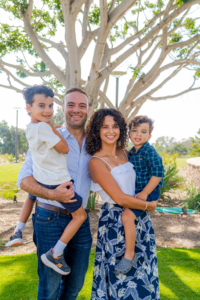
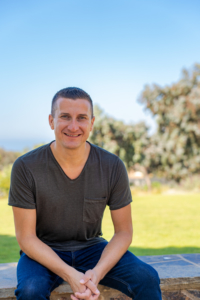 You would think that as the executive director of San Diego LGBT Pride, Fernando Zweifach López Jr., who uses the pronoun they, has done all the coming out they possibly can. A queer, non-binary individual who has worked for many years on civil rights issues, López also speaks openly and often about their father’s family, Mexican-American migrant workers who tilled the fields of rural California.
You would think that as the executive director of San Diego LGBT Pride, Fernando Zweifach López Jr., who uses the pronoun they, has done all the coming out they possibly can. A queer, non-binary individual who has worked for many years on civil rights issues, López also speaks openly and often about their father’s family, Mexican-American migrant workers who tilled the fields of rural California. Stacie and Jeff Cook understand commitment. They live it.
Stacie and Jeff Cook understand commitment. They live it.
